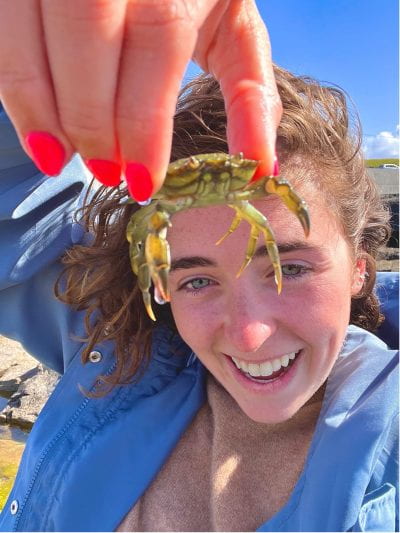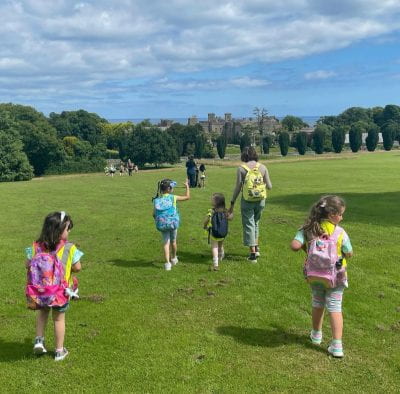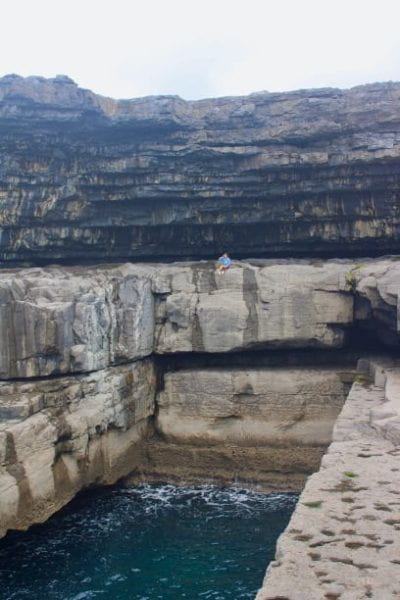Peyton Mosman is a fourth-year Honors College Fellow from Dallas, Texas, who is studying psychology and social work. She interned abroad this summer in Dublin with an organization providing resources to the city’s immigrant communities. For Peyton, gaining a sense of self-reliance proved to be one of the most important lessons learned while overseas.
The way I see it, America and Ireland have one big thing in common: both are isolated countries. Ireland is a relatively small island off the coast of Europe. This has brought the Irish peace in recent years. Many of their systems are the same as mainland Europe’s … so they have managed to stay out of most recent European drama (the exception being the serious conflicts in Northern Ireland).” The Irish are perfectly content to mind their own damn business.
America, on the other hand, is an island in its own way: with such minimal exposure to different lifestyles, we have no concept of how anyone else lives. We are raised with a centralized thinking that many European countries don’t have. Our generation is not expected to travel before we grow up, and this cultural stagnancy costs us knowledge. I truly believe that living in a place where public transportation supports not just the city or country but the whole continent makes a person invincible.
Supporting Ireland’s Immigrant Families
I am residing in Dublin, which is a huge immigration hub. I am interning at the Hill Street Family Resource Centre located in Dublin 1, where 80% of neighborhood residents are immigrants. Though the area is referred to as Dublin’s Chinatown, residents come from all over, and my job is to help habilitate immigrant families to the Dublin area. At least, that is how I will phrase it on my resume, for the job is much less formal than the title implies.
Throughout the year, Hill Street runs various programs to help set parents and children up for success in Ireland, as well as hosts community events. The programs Hill Street puts on provide for thousands of people: families and children of business owners, technicians, office workers, merchants and laborers, many of whom are immigrants or first-generation Irishmen, all of whom lack the village it takes to raise their children. That is what Hill Street is there for.
The program they are most renowned for is Prep for Preschool. In Ireland, children are given two years of free pre-school before beginning real school at age five. Oftentimes, immigrant children have never been away from their parents, who may have no friends or family nearby to help care for them. Many kids struggle being more than a few minutes away from their mom and dad. Prep for Preschool acclimates them to a schooling environment and builds up their tolerance for being away from parents. As the kids become more independent and the length of their time apart grows, the parents are offered classes downstairs, which cover everything from how to register for free healthcare to basic English. A plethora of information is made available to these parents while their children develop necessary social skills in another room, all at no cost.
The event Hill Street is most renowned for is Lunar New Year. (If you’re still reading this, please Venmo $5 to @peyton-mosman. I am saving for a plane ticket to attend in February!) The celebration lasts several days and has over 5,000 attendees, even during COVID. There is a potluck style table set up so families can share their culture’s cuisine: authentic food from China, Thailand, India, Poland, Ukraine, Brazil, Germany, Hungary and many more countries, some I’d never heard of before. Children spend months preparing dances and performances. There is live music, a stage and even a cotton candy machine. I hope to attend someday, but luckily I was around for Hill Street’s Intercultural Family Fun Day, which proved to be a slightly toned-down version of Lunar New Year with about a thousand people in attendance, including several members of the Dublin City Council.
You may be wondering: how does Hill Street pay for all of this? Who coughs up the dough for an event for thousands of people? Upon my arrival I learned that Hill Street is a private organization. Most of the funding comes from the Dublin City Council, and the money is allocated through approved proposals. For example, Prep for Preschool and the Chinese New Year’s Celebration were approved proposals. When the conflict in Ukraine began, Hill Street proposed a bi-weekly day care for parents and children. This offered the mothers a place to network, ask questions, and meet other Ukrainian families experiencing the conflict. It gave the children a sense of normalcy, access to playgrounds, and exposure to other kids. The city of Dublin had also placed dozens of Ukrainian mothers in the hotels in Dublin 1, where they stayed for months until more permanent housing became available, and their fathers and sons and husbands could join them.
The program I have helped to put on over the last four weeks is referred to as Summer Camp: a group of 16 kids comes Monday through Friday, 10 a.m. to 3 p.m., to go on three adventures: one to a local beach and one to a local park (both via public transportation) and one “Family Trip” via private bus. The family trip consists of the summer camp kids (a new group each week) and about 70 families from the area (a lot of the same faces I love). So, to put it in my perspective, I have spent the last month travelling Dublin, sight-seeing with some dear friends I have made over the summer, none older than seven or younger than two, some of whom don’t speak English. But hey, how much do you understand a three-year-old anyway?
Learning Self-Reliance
Now, buckle in, because I am about to get to the most important lesson in this blog post, the cherry on top of this whole freaking thing. The fact is that the hardest part of study abroad is getting there. There are so many hoops to jump through, so many meetings and emails and phone calls and scholarship opportunities that you need because study abroad can be very expensive. If you do all that, you will find yourself getting on a plane with no clue in the world what you are walking in to. And then you just live–that is the lesson. Because if studying abroad has shown me anything it is that I can do it: I can make my way in the world. This is the first time I am the only one accountable for myself and the only time I will be accountable for only myself. I am so unbelievably young and free, and that is the beauty of being in your twenties.
As this blog post (which has turned out to be far more heartfelt than I intended) comes to a close, I want you to know that this summer I also travelled six out of the eight weekends I was abroad. During the week I worked 9-4, but I got off early on Fridays and managed to see London, Spain, Italy, Switzerland, Belfast and the Aran Islands. The experience of working and living in another country is the part of my summer abroad that enabled me to grow as a person. They say the point of an internship is to learn what you want from your career. This experience has confirmed not only that this is the field of work I want to go into, but also that I want to work in Ireland. So, in a year, with a bachelor’s in psychology, I hope to go work and study in Ireland. It isn’t as warm as Texas, but with free healthcare and affordable education, Ireland has definitely won my heart.




